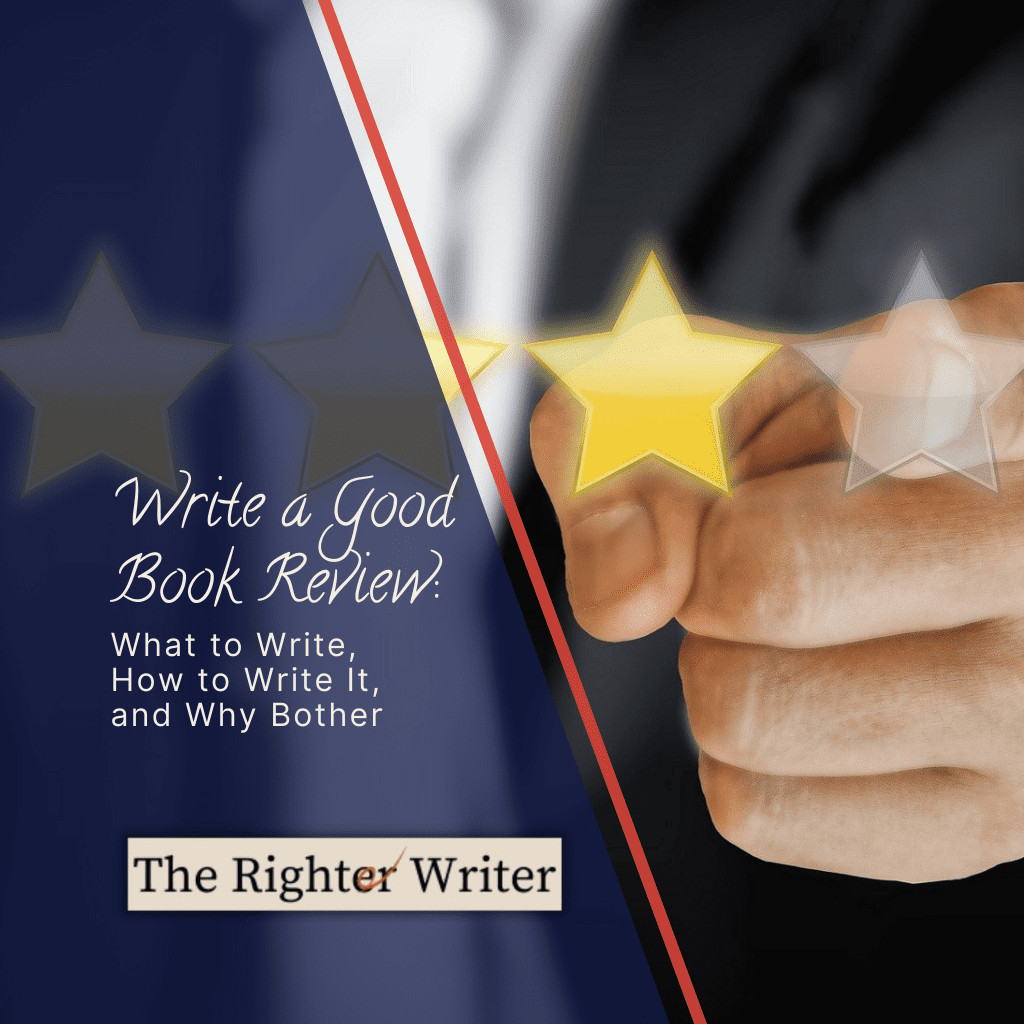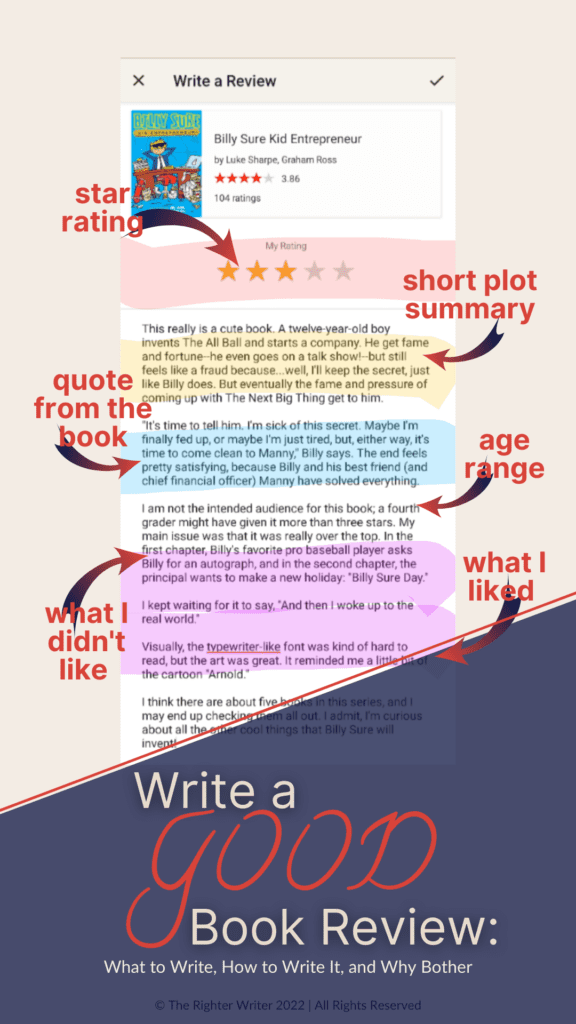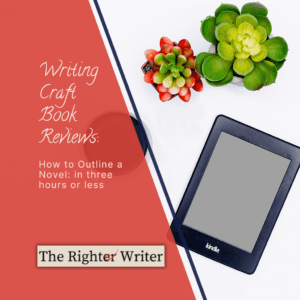
Writing Craft Book Reviews: A Book A Week
Fourth and last (for now!) in our series of book reviews featuring Kindle Unlimited books that explain ways to outline a novel. Let’s get ready for NaNoWriMo!
I'm an affiliate.
Some of the links on this page are affiliate links, but the opinions in my posts are my own, and I only mention products that I like and use myself. As an Amazon Associate, I earn from qualifying purchases. What that means is that if you click one of the links on my site and make a purchase, I might recieve compensation at no extra cost to you.

Book reviews can be hard to write.
You know whether you like a book, and you sort of know why, but do you know how to write a good book review?
And why even bother?
It takes work to make it good, but, if you are willing to put in the effort, a book review will really help both readers and authors.
Readers look at reviews in order to get an idea of what a book is like before they choose it. If your review is honest and tells people what they can expect from the book, you can keep them from wasting money and time on something that they won’t like.
Reviews are important to authors because they help get the word out about their books. Books with lots of reviews sell better than books with only a few reviews.
The most useful reviews are well-written, objective, and constructive.
I get that it seems complicated, but if you break it down into its individual parts, it’s not so bad.
Here’s a list of some information that you can put into your book review. When I write a review, I try to include a lot of these, but I don’t always include them all.
I think this one is pretty self-explanatory.
If you love a book, give it five stars.
If you didn’t like it, give it one star.
I always like to rate books, and I think it’s helpful for other readers to see what others thought about the book.
Most sites allow you to just leave a star rating, but just a rating isn’t as useful to a reader as a full review with more information.
Keep in mind, though, the rating scale of the site where you are going to post your rating.
Amazon says that a four-star review means “I like it.”
On Goodreads, though, “I like it” is only three stars.
Three stars on Amazon is “It’s okay,” but on Goodreads, that’s a two-star review.
You might want to change your rating based on which site you’re leaving the review on.
This is usually the first thing I include in my review.
It’s a brief overview of what happens in the book.
I don’t give away any spoilers in my reviews, but other people do. If your review has information about plot twists or surprises, make sure to warn readers, so they can skip that part if they want.
Some sites, like Goodreads, have spoiler tags that will hide any words that are labeled as spoilers.

If you’ve read other books by a similar author, or if this book reminds you of another book, say so! It can be helpful for readers to know what kinds of books they might enjoy if they decide to read this one.
If I love police procedurals and a review says that a book is “a lot like the In Death books by JD Robb,” then I’m a lot more likely to try it out.
Some books are labeled as being for adults, some for young adults, and some for kids.
Even within those groups, a six-year-old and a ten-year-old aren’t going to read the same things.
If you have an idea what age group might like this book, let people know!
I like to mention the age of the main character. I think it’s useful to know if the book is about someone who is retired or someone just starting university.
Even if both books are cozy mysteries, the ages of the main characters will turn them into very different stories.
If you can, pull your favorite quotes from the book and put them in your review. It helps to back up what you’re saying about a book if there are actual lines that people can read for themselves.
It also helps people get an idea of what the writing style is like and if they’ll enjoy it.
Pulling out quotes is especially easy if you read the ebook. Just highlight lines that grab you as you’re reading, then go back and copy and paste them when you’re ready to write your review.
This is one of my favorite things to talk about in reviews. I like to give people a hint of what they can expect so that they know if the book is right for them.
I also think of it as a warning. Do you like books that make you cry or do you hate them? Either way, it’s good to know in advance what you’re in for.
It’s always good to share your thoughts on a book!
If you liked something, say why.
Remember, the goal is to help other people decide if they want to read the book, so the more detail you can put in, the better.
This is your chance to really tell people what you think!
If there’s something you want them to know before they read the book, this is the place to put it.
People need to know what to expect from a book before they start it.
Does the main character cuss a lot? Is there no sex at all, even though it’s billed as a steamy romance? Is it a stand-alone novel or is this the start of a series? Is there a cliffhanger at the end?
None of these things are inherently bad in a novel, but some people may not want to be surprised by them.
Readers will appreciate it if you warn them so that they can make an informed decision about buying the book.
(Personally, I hate cliffhangers and won’t buy a book that stops in the middle of a story unless the next book in the series is already published. That way I can binge-read the whole thing!)

This is a tough question, and there isn’t a right answer.
I don’t think anyone should ever write a review they’re not qualified to write, and that includes negative reviews. If you didn’t finish the book, if you didn’t understand it, or if it just wasn’t your cup of tea, it’s not fair to the author or other readers for you to review it. Instead, wait until you’ve read something that fits your expectations and then leave a positive review.
Books often get negative reviews when they don’t live up to a reader’s expectations.
For instance, if a book is advertised as a romance, but there isn’t a happily ever after ending, that is going to make a lot of romance readers angry. In cases like this, negative reviews can be helpful if they’re done correctly.
A critical review should be honest, objective, and constructive. It should explain why you didn’t like the book without being mean or insulting.
If you can give specific instances of times when the book seemed to promise one thing and then ended up being something else, you can keep other readers from getting disappointed.
There are many places you can post reviews, but the two big ones I use are Amazon and Goodreads. You could also check out the book’s website if it has one.
If you’re reviewing a book from a new or little-known author, keep in mind that Amazon reviews are really important to them.
It’s generally accepted that the more reviews a book has, the more copies that it sells.
Reviewing an author’s book is a great way to support them.
My favorite place (outside of Amazon) to post a review is Goodreads. It’s a free site where readers can review books and connect with other readers.
You can also create shelves (these are like categories) and add books to them, which is a great way to keep track of what you’ve read and what you want to read next. You can also join groups related to your favorite books, authors, or genres and participate in discussions with other readers. There are also forums where you can ask for book recommendations.
It’s a great place to find friends who love reading as much as you do!
(Here is the link to my Goodreads profile. Let’s be friends!)
Don’t forget to proofread your writing before you post your book review!
You’re writing for an audience that reads a lot, so they are likely to catch the smallest mistake.
If you need to review what to check when you’re proofreading, check out my CUPS for Editing posts:
So, there you have how to write a good book review, where to post it, and why you should!
I hope these tips have been helpful—let me know if I missed anything.
And, as always, you can contact me here if you want to know more about what I do here at The Righter Writer!

I help authors, researchers, business people, students, and web marketers to polish their writing before they send it out into the world.

Fourth and last (for now!) in our series of book reviews featuring Kindle Unlimited books that explain ways to outline a novel. Let’s get ready for NaNoWriMo!

Third in our series of book reviews featuring Kindle Unlimited books that explain ways to outline a novel. Let’s get ready for NaNoWriMo!

Second in our series of book reviews featuring Kindle Unlimited books that explain ways to outline a novel. Let’s get ready for NaNoWriMo!

2 Responses
I absolutely need this since I sometimes write book reviews. Bookmarking this. Thank you for sharing.
I’m so glad it’s useful!